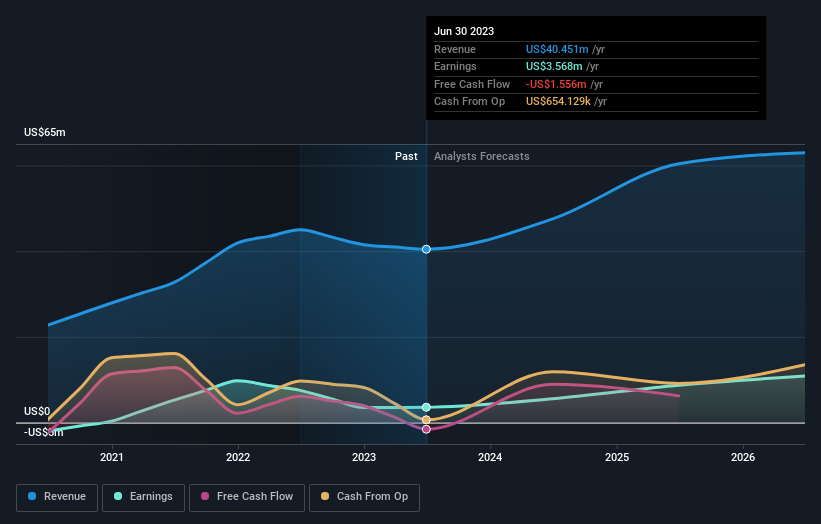With a 49% stake, Cogstate Limited (ASX:CGS) insiders have a lot riding on the company
Key Insights
Cogstate's significant insider ownership suggests inherent interests in company's expansion
A total of 3 investors have a majority stake in the company with 57% ownership
A look at the shareholders of Cogstate Limited (ASX:CGS) can tell us which group is most powerful. And the group that holds the biggest piece of the pie are individual insiders with 49% ownership. That is, the group stands to benefit the most if the stock rises (or lose the most if there is a downturn).
So, insiders of Cogstate have a lot at stake and every decision they make on the company’s future is important to them from a financial point of view.
Let's take a closer look to see what the different types of shareholders can tell us about Cogstate.
See our latest analysis for Cogstate
What Does The Institutional Ownership Tell Us About Cogstate?
Institutional investors commonly compare their own returns to the returns of a commonly followed index. So they generally do consider buying larger companies that are included in the relevant benchmark index.
We can see that Cogstate does have institutional investors; and they hold a good portion of the company's stock. This suggests some credibility amongst professional investors. But we can't rely on that fact alone since institutions make bad investments sometimes, just like everyone does. It is not uncommon to see a big share price drop if two large institutional investors try to sell out of a stock at the same time. So it is worth checking the past earnings trajectory of Cogstate, (below). Of course, keep in mind that there are other factors to consider, too.
Hedge funds don't have many shares in Cogstate. The company's largest shareholder is Martyn Myer, with ownership of 27%. The second and third largest shareholders are David Dolby and Dagmar Dolby Fund, Endowment Arm, with an equal amount of shares to their name at 15%. Furthermore, CEO Bradley O'Connor is the owner of 2.6% of the company's shares.
To make our study more interesting, we found that the top 3 shareholders have a majority ownership in the company, meaning that they are powerful enough to influence the decisions of the company.
While studying institutional ownership for a company can add value to your research, it is also a good practice to research analyst recommendations to get a deeper understand of a stock's expected performance. While there is some analyst coverage, the company is probably not widely covered. So it could gain more attention, down the track.
Insider Ownership Of Cogstate
While the precise definition of an insider can be subjective, almost everyone considers board members to be insiders. Management ultimately answers to the board. However, it is not uncommon for managers to be executive board members, especially if they are a founder or the CEO.
I generally consider insider ownership to be a good thing. However, on some occasions it makes it more difficult for other shareholders to hold the board accountable for decisions.
Our most recent data indicates that insiders own a reasonable proportion of Cogstate Limited. Insiders own AU$129m worth of shares in the AU$261m company. It is great to see insiders so invested in the business. It might be worth checking if those insiders have been buying recently.
General Public Ownership
The general public-- including retail investors -- own 13% stake in the company, and hence can't easily be ignored. While this size of ownership may not be enough to sway a policy decision in their favour, they can still make a collective impact on company policies.
Public Company Ownership
We can see that public companies hold 6.8% of the Cogstate shares on issue. This may be a strategic interest and the two companies may have related business interests. It could be that they have de-merged. This holding is probably worth investigating further.
Next Steps:
It's always worth thinking about the different groups who own shares in a company. But to understand Cogstate better, we need to consider many other factors. Take risks for example - Cogstate has 2 warning signs (and 1 which makes us a bit uncomfortable) we think you should know about.
If you would prefer discover what analysts are predicting in terms of future growth, do not miss this free report on analyst forecasts.
NB: Figures in this article are calculated using data from the last twelve months, which refer to the 12-month period ending on the last date of the month the financial statement is dated. This may not be consistent with full year annual report figures.
Have feedback on this article? Concerned about the content? Get in touch with us directly. Alternatively, email editorial-team (at) simplywallst.com.
This article by Simply Wall St is general in nature. We provide commentary based on historical data and analyst forecasts only using an unbiased methodology and our articles are not intended to be financial advice. It does not constitute a recommendation to buy or sell any stock, and does not take account of your objectives, or your financial situation. We aim to bring you long-term focused analysis driven by fundamental data. Note that our analysis may not factor in the latest price-sensitive company announcements or qualitative material. Simply Wall St has no position in any stocks mentioned.


